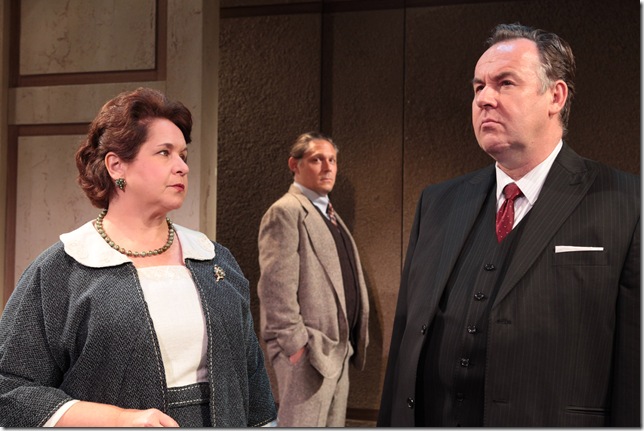Theatergoers who feel they know playwright Michael Frayn from the evidence of his most successful stage work, the backstage farce Noises Off! — or even from his thoughtful drama on the architecture of relationships, Benefactors, which Palm Beach Dramaworks produced in 2008 — are bound to be taken aback by his most cerebral script, the 2000 Tony Award-winning best play Copenhagen.
True, they are each constructed like a puzzle, asking an audience to consider the central matter at hand from multiple perspectives, but if the two earlier plays make demands of us, and they do, Copenhagen is like a theatrical graduate course, using nuclear physics as a metaphor for an enigmatic moment in history that has intrigued and perplexed students of World War II for almost 70 years.
The good news is much of the scientific jargon that Frayn tosses about is not crucial to one’s enjoyment of the bracing Dramaworks production, directed with precision by J. Barry Lewis. Yes, there is an additional layer of meaning to be had if you happen to have been paying attention in your quantum mechanics class, but do not be deterred if you never got beyond remedial geology.
The playwright that Copenhagen most brings to mind is Tom Stoppard, who similarly challenges an audience with heady dialogue, and often leaves us scratching our heads, producing the dandruff of information overload. Still, it is hard not to admire a play that flatters theatergoers with the presumption of knowledge. Even if, for both Frayn and Stoppard, the results often engage the intellect and bypass the emotions.
Copenhagen could stand to have about a half-hour of its verbiage pruned for optimum effectiveness, but as is it makes for the sort of compelling theater of substance with which Dramaworks has forged its reputation.
Frayn puckishly sets the play in the afterlife, as Germany’s Werner Heisenberg and his Danish colleague Niels Bohr try to sort out their brief, mysterious meeting in 1941, a meeting that could well have changed the course of the war and, consequently, of the world.
These two physicists were student and teacher, protégé and mentor, surrogate son and father figure, but after their meeting — which ended abruptly — they would not speak to each other for eight years. Was Heisenberg after news about the Allied Forces’ efforts to build an atomic bomb? Was he looking for information that could assist Germany in building its own nuclear weapon?
Ever the gamesman, Frayn suggests three different solution to the Copenhagen riddle, dramatizing three successive “drafts” of what might have transpired, leaving it up to the audience to decide what really happened.
Present at the meeting — though not along for the crucial, confrontational walk in the park — is Bohr’s wife Margrethe. In the play, she is a valuable third wheel, a stand-in for the audience who challenges and corrects the two men’s recollections, while demanding they clarify their thinking and express it in layman’s language.
And sure enough, even when the conversation flies over our heads, we get the impression that the three actors at Dramaworks actually understand everything they are saying. Lewis has a trio of verbally adroit, articulate performers, who go a long way towards humanizing the talking-heads debate.
Colin McPhillamy is a low-key Bohr, struggling to keep his temper in check, as he parries the accusations of the more excitable Heisenberg (Christopher Oden). Acting as their mutual inquisitor is Elizabeth Dimon as Margrethe Bohr, who can express so much with a mere arched eyebrow.
Although the script indicates virtually no stage action, Lewis choreographs his cast with skill, as they move about Michael Amico’s faux-marble, institutional way station set like the charged particles of an atom.
One part historical mystery, one part post-graduate physics tutorial and one part human drama, Copenhagen deserves to be experienced, no matter how much you actually absorb and digest.
COPENHAGEN. Palm Beach Dramaworks, 322 Banyan Blvd., West Palm Beach. Through Jan. 31. Tickets: $42-$44. Call: (561) 514-4042.
